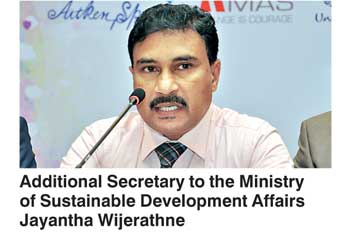Tuesday Feb 17, 2026
Tuesday Feb 17, 2026
Friday, 8 December 2017 00:27 - - {{hitsCtrl.values.hits}}
 By Charumini de Silva
By Charumini de Silva
The Government yesterday said that it would be difficult to achieve Sustainable Development Goal (SDG) number one - no poverty - by the given period unless the public and private sectors as well as the people of the country worked together to alleviate poverty.
Despite initiating various poverty alleviation programs since independence, the Government claimed that none of them was able to achieve the expected results in Sri Lanka and it called on all parties to collectively help reduce poverty in the country.
Under the Grama Shakthi People’s Movement, implemented by President Maithripala Sirisena, the Government has identified 1,000 Grama Niladhari Divisions (GNDs) across the country for 2017, where 700 of them are below the poverty line, while the balance 300 are production-oriented centres that need to be developed.
“We have come up with a ‘Triple P’ strategy which includes the public sector, private sector and people. One of the main reasons why poverty alleviation programs did not achieve the expected results was because everyone thinks it is only a Government responsibility,” Additional Secretary to the Ministry of Sustainable Development Affairs under the President, Jayantha Wijerathne, told at a forum held in Colombo yesterday.
He said that the Government had identified another 1,000 GNDs for 2018, where 500 were below the poverty line and the balance comprised production-oriented economic centres.
“Most of these identified GNDs require basic needs. We are now working with the private sector to expedite this process and uplift the lives of all Sri Lankans.
According to him, the Government will provide the right policies, monitor progress and facilitate the process but the execution will be done by the private sector and general public.
“We believe we can work with the private sector. Already we have had a series of discussions with the private sector and other agencies that are involved in the poverty alleviation program,” he said.
In September 2016, the Centre for Poverty Analysis (CEPA) responded to a request by the Presidential Secretariat to write a briefing paper on the status of poverty in Sri Lanka. The President thereafter declared 2017 the Year for Poverty Alleviation. In October, President Maithripala Sirisena launched the Grama Shakthi People’s Movement to alleviate all forms of poverty in the nation by building a strong and respectful economy.
This declaration and the appointment of a Special Committee for Poverty Alleviation comprising parliamentarians representing a cross section of political parties have revitalised discussions on poverty among policymakers, researchers, practitioners, the media and the general public.